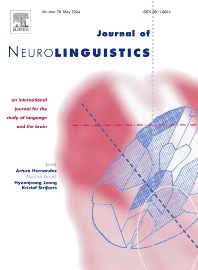Journals in Language and linguistics
Journals in Language and linguistics
- ISSN: 1475-1585
Journal of English for Academic Purposes

- ISSN: 0094-730X
Journal of Fluency Disorders

- ISSN: 0749-596X
Journal of Memory and Language

- ISSN: 0911-6044
Journal of Neurolinguistics

- ISSN: 0095-4470
Journal of Phonetics

- ISSN: 0378-2166
Journal of Pragmatics

- ISSN: 1060-3743
Journal of Second Language Writing

- ISSN: 0271-5309
Language & Communication

- ISSN: 0388-0001
Language Sciences

- ISSN: 0024-3841
Lingua
